 | OFFICER IN DISTRESS
| OFFICER IN DISTRESSNew tragedies compel Detective Brent Jex to admit he needs help.

It didn't take the Taliban long to capture Bowe Bergdahl, a U.S. soldier who slipped out of an Army outpost in Afghanistan with only a backpack, water, a notebook and a few knives late on June 30, 2009. Before he became the most notorious prisoner of war in modern times, Bergdahl was simply a missing American, and his disappearance kicked off an exhaustive search.
During the hunt, a four-vehicle convoy headed to a town called Yahya Khel on Sept. 4. Sitting in the first MRAP (mine-resistant, ambush-protected vehicle) was Mike Valdes, an Army reservist from Utah whose civilian job was working as an officer with West Valley City police.
This was Valdes' second deployment. As a member of a civil-affairs unit, his assignment was to talk with tribal leaders with the help of an Afghan translator. It fit his personality. Valdes, who was a lanky 6-foot-2 and sported a clean-shaven scalp, was naturally engaging and funny.
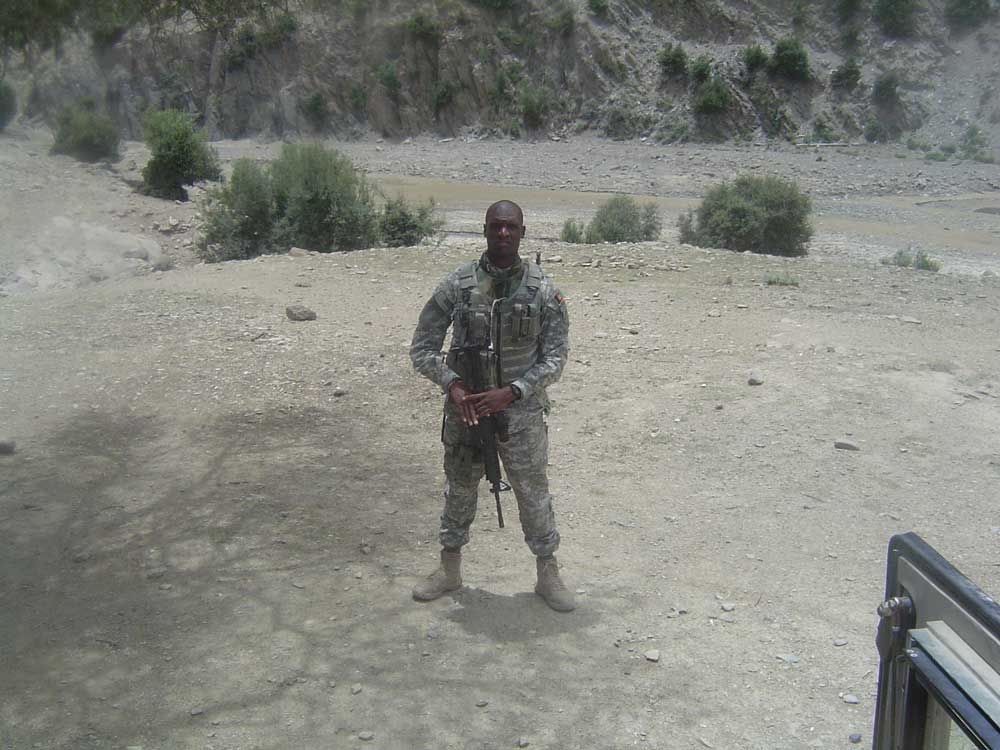
Mike Valdes was an Army reservist, who served two tours in Afghanistan, and a West Valley City police officer.
Photo courtesy of Stacy Valdes-Hopkins
His friend Kourtney Berge, a fellow civil-affairs officer from Utah, was a gunner in the convoy's third vehicle.
On one side of the road was an orchard with a few dilapidated structures, while the other side had bigger buildings with walls made mostly of mud. Buried in the middle of the road was a bomb.
Valdes' vehicle missed it, but the second MRAP did not. The explosion severely damaged the vehicle, but the soldiers inside were generally fine, beyond a few concussions and some bruises.
Soldiers from the Army's 4th Brigade Combat Team, 25th Infantry, inspected the damage to see whether there was a quick way to get the busted MRAP out of the road. Valdes checked it out, too, but he didn't see how he could help, so he went back to his armored vehicle and snagged an MRE (meal ready to eat). Not more than 10 minutes after the first explosion, as he was unpacking his snack, Valdes heard a commotion and then felt the force of another blast.
An insurgent hiding along the roadside orchard stood up and fired a rocket-propelled grenade. Second Lt. Darryn Andrews, who was born in Ogden, Utah, but had a toddler and a pregnant wife waiting for him in Texas, saw the enemy fighter, yelled "RPG" and instinctively pushed guys out of the way. The missile struck Andrews, 34, exploding on contact and killing him instantly. Seconds later, another RPG hit, and then another. The Americans returned fire, and the fight would go on in bursts for hours.
One of the men Andrews pushed out of the way was Pfc. Matthew Michael Martinek, 20, a skinny kid from Illinois. He had taken some shrapnel and was in bad shape. Valdes tried to calm him down while others called in a helicopter. By the time help arrived, Martinek had lost consciousness. He died a few days later in a military hospital in Germany.
Everyone else survived, though some were wounded. Valdes, protected by the armored vehicle, emerged unscathed physically but scarred emotionally.
"He had to react to that and put body parts in piles," said Clayton Morgan, who was the commander of the Utah-based 405th Civil Affairs Battalion. Morgan went to the scene the next day, took stock of the ambush and talked to Valdes. "He was pretty shaken up."

“
He had to react to that and put body parts in piles."
Clayton Morgan, commander of the 405th Civil Affairs Battalion
Berge, who is now a firefighter in North Carolina, said Valdes talked about how horrible it was to comfort Martinek as he was dying and then to have to place Andrews' remains in a body bag. But it wasn't long before Valdes seemed to act normally. He started telling jokes and teasing Berge.
"He wouldn't let you understand how bad it affected him."
Stacy Valdes knew something was wrong. It had been almost a week since she heard from her husband, the longest they'd gone without talking since he deployed. "He probably cried for an hour and a half, just bawled," she said. "And I was … shocked. I had never seen that side of my husband. I just sat there and listened.
"I remember him saying this to me: ‘It's one thing when you are dealing with complete strangers who have been killed. You can kind of detach from that, but when it's someone in your unit, someone you have shared stories with and 10 minutes ago, you are having a conversation with about your families …' " Stacy's voice trailed off, just as her husband's had. "To actually have to deal with people he cared about dying in front of him, I mean, that just threw him, and when I got off the phone that day, I said to my mom, ‘You know what? He's never going to be the same.'"
Valdes didn't get home for seven more months. One of the first things he did was order memorial bracelets to honor Martinek and Andrews, who was posthumously awarded the Silver Star, the third highest military decoration. Once he put those bracelets on, Valdes never took them off.
Suffering from survivor's guilt, "he just didn't want to talk to anybody, including me," Stacy said.
This wasn't out of character. He'd had bouts of depression for as long as she had known him, which she chalked up to his upbringing.
Valdes was born in the Bronx in 1975 to a mother who was 15 and an 18-year-old drug dealer, who was shot to death before his son turned 3. Valdes' stepfather, a Navy man, was abusive to him and his mother, Lynette. She eventually shipped the teenage Valdes to Utah, where he lived with two aunts who had moved from New York for work.
After high school, Valdes enlisted and served two years in Washington state and Texas as part of a dental/medical unit.
Valdes entered the police academy just after he and Stacy married in 2000, and within a few years, he was working as a school detective at West Lake Junior High. It was one of the Salt Lake Valley's most diverse schools — and the same one he'd first attended when he moved to Utah. Valdes, who was black, enjoyed being a role model to students of color, connecting with them over basketball.
But after his first combat deployment, Valdes occasionally would zone out, staring at the computer in their home office for hours. After his second deployment and the fatal firefight, such episodes became more frequent, more prolonged, and filled Stacy with dread. Would she and their two boys come home to see happy Mike or depressed, silent Mike?
Then assigned as a patrol officer, Valdes would occasionally help the narcotics unit with undercover work. Fellow cops liked him, saying he made a room lighter just by walking through the door. The Valdes they knew wasn't the same man with whom Stacy lived.
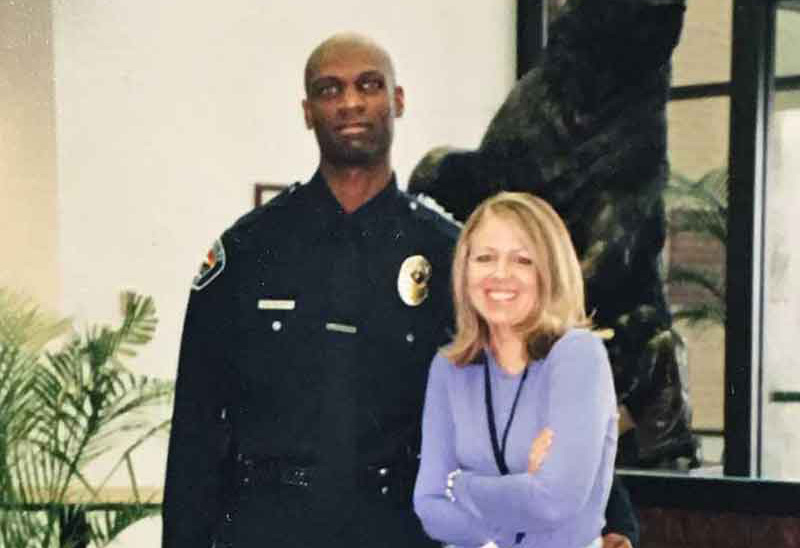
Stacy Valdes said her husband, Mike, suffered from depression that got worse when he returned from Afghanistan.
Photo courtesy of Stacy Valdes-Hopkins
In just a few weeks, West Valley City had a string of murder-suicides, and Valdes ended up working each one. In two of those cases, he had to inform family members about the deaths. One man responded to the news of his parents' demise by saying, "We're not surprised." It stuck in Valdes' mind.
Stacy saw the strain but assumed her husband was strong enough to handle it. She'd seen the cycle dozens of times. The good times were good, and they'd just get through the rest.
Then, on March 19, 2013, her brother-in-law, West Valley police Lt. Matt Elson, called at 10 p.m., asking, "Where's Mike?"
Stacy initially found it odd that Mike went to work wearing a dark blue hoodie and a pair of Nike shoes from his extensive collection, not his police uniform, but then she just thought he was going undercover. With Elson still on the phone, she looked in the driveway. His police cruiser was still there. He must have driven away in the family's Infiniti SUV. A couple of hours later, Elson stopped by with the spare keys to the cop car. He found Mike's keys and cellphone on the driver's seat.
"In the back of our minds, we probably both knew," Stacy said. "He never would have left his cellphone."
It's unclear what Mike did when he left the house Tuesday evening. But two days later, while driving through a mountain tunnel in rural Wyoming, roughly 180 miles from home, he put his Glock to his head and pulled the trigger. The Infiniti swerved, then crashed against a tunnel wall. Deputies from the Sweetwater County Sheriff's Office found him dead.
Stacy has no idea why Mike would drive to Wyoming. Her best bet is that he didn't want any Utah cop to find him. "It was kind of his way to protect the people he knew," she said.
That didn't stop Valdes' death from rocking Utah's cop community. How could the jokester with the big smile take his own life?
"Everyone liked Mike," said West Valley City Deputy Chief Mike Powell. "This is going to be tough for a lot of officers here who knew him as a friend."
That group included Brent Jex, who had taught at the police academy with Valdes. "Mike's [suicide] was such a surprising tragedy," Jex said. "His death affected hundreds and hundreds of people."
As president of the state's Fraternal Order of Police, Jex and his fellow board members decided they had to do something. If an officer like Valdes died by suicide, it was likely many more were hurting and hiding it.
The board knew many officers were skeptical of department-provided therapists, fearing they would rat them out to the brass, which could jeopardize their assignments or even their jobs. So the FOP developed its own mental health program. The idea was to raise money to pay for the first two therapy sessions for any officer who needed help. Jex envisioned officers who were also veterans, such as Valdes, using the program, or maybe a detective traumatized by a child-abuse investigation. It never crossed his mind that he'd eventually become the program's test case.
But then another friend lost his life on the job and Jex felt a new wave of guilt.
experiencing suicidal thoughts at 1-800-273-TALK (8255)
A silver Volvo jumped a curb and rammed a stop sign. It scaled a boulder and blew through a wooden fence in Draper, a bedroom community at the southern end of the Salt Lake Valley. High on meth, Timothy Troy Walker, a 35-year-old homeless man who lived in that car, drove it as far as it would go — which was just a few more blocks. Out of gas and with a flat tire, his Volvo came to an awkward stop on Fort Street, in an area with wide roads and small homes.
Walker, a hefty man with a black beard, got out to inspect the damage. He was carrying a handgun. Walker had become paranoid, collecting weapons for protection. Inside the car was Traci Vaillancourt, a onetime aspiring model who'd seen her life derailed by a rare blood disease that caused her face, neck and limbs to swell. She got hooked on painkillers, suffered a series of strokes, became homeless and eventually dated Walker.
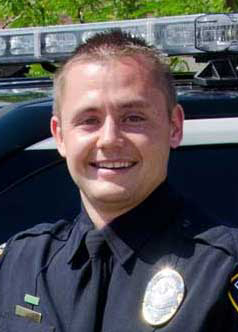
Draper Sgt. Derek Johnson
It was almost 6 a.m. on Sept. 1, 2013. Draper Sgt. Derek Johnson was just finishing his patrol shift as he drove up Fort Street and saw an oddly parked Volvo. Johnson pulled alongside and asked if he could help. Without warning, Walker shot him in the chest. As the officer tried to drive away, Walker pumped three more bullets into the police SUV. Johnson, 32, reached for his radio and called for help, but the dispatcher couldn't understand his garbled message. Three blocks from where he'd been shot, Johnson crashed his SUV into a tree.
Vaillancourt, 34, got out of the car. Walker shot her in the back. Then, he placed the barrel against the side of his head and pulled the trigger once more. They would survive.
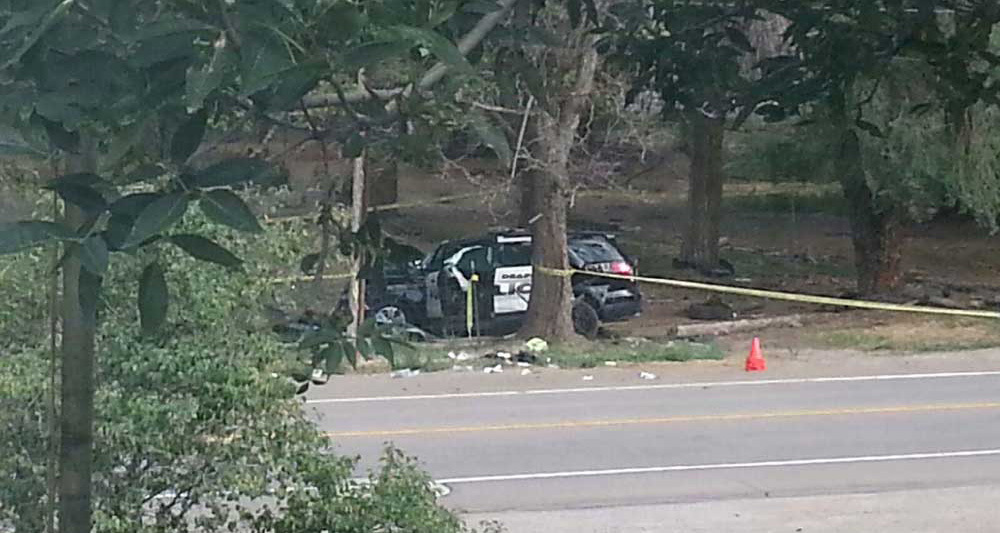
After getting ambushed and shot on Sept. 1, 2013, Sgt. Derek Johnson tried to drive away. Seriously injured, he crashed into a tree.
Photo courtesy of David Szelag
Jex heard the "officer down" call on his way home from a graveyard shift and followed the radio traffic as he rushed to Fort Street.
On the way, someone reported that it was a Draper sergeant who was hit. His first thought was, "Oh no, not Clint."
Clint Fackrell worked with Jex as part of the Joint Criminal Apprehension Team, or JCAT, a specialized unit spanning police departments and federal agencies that aggressively hunted felons. The team members became tight, often holding barbecues and other get-togethers.
When Jex arrived, he saw Fackrell and felt a wave of relief. Paramedics had pulled the wounded officer from his crashed vehicle and Jex got a good look at his face — but he drew a blank.
Jex only knew two men well in the Draper Police Department — Fackrell and Derek Johnson, who was not only a JCAT member but also president of Draper's Fraternal Order of Police. Jex and Johnson bumped into each other several times a month. He didn't recognize the injured officer. Jex returned his focus to Fackrell. "What can I do to help?"
A medical helicopter was landing to rush Johnson to Intermountain Medical Center while ambulances arrived to take Walker and Vaillancourt to the same hospital. Fackrell asked Jex to accompany Walker's ambulance.
Before he drove off, Jex stared at the crashed police SUV. He watched the paramedics at work and heard what seemed like an unending stream of sirens headed that way.
"I wonder if this is what Ron's deal was like," he thought.
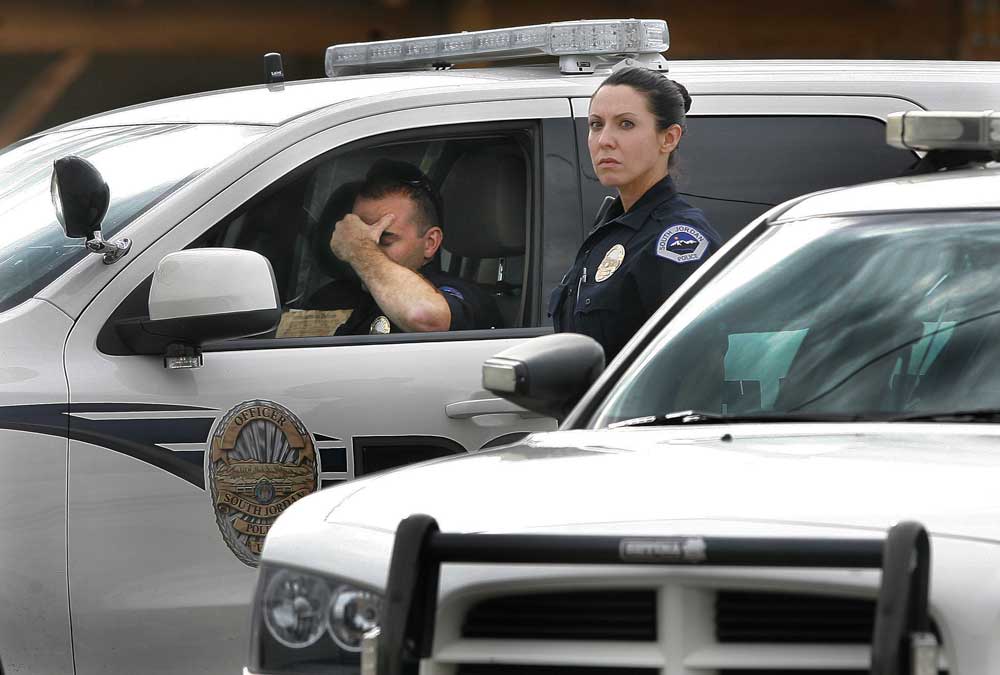
Two South Jordan police officers near a roadblock in Draper on Sept. 1, 2013, after Draper Sgt. Derek Johnson was ambushed and shot.
Photo by Scott Sommerdorf | The Salt Lake Tribune
Jex arrived just as the helicopter was touching down. He stood by as medical staff rushed the officer into one room and Walker into the room next door.
As hospital employees twice asked him for the officer's name, Jex answered: "I'm sorry; I don't know." Once doctors realized they couldn't save the officer, Jex took a deep breath and called Fackrell. "They pronounced him dead. I'm sorry."
Fackrell said nothing in return, so Jex broke the silence. "What do you need?" Fackrell told him to wait there for Draper Police Chief Bryan Roberts. When Roberts arrived a few minutes later, a nurse asked him for the name of the fallen officer. Roberts responded: "Sgt. Derek Johnson."
Jex's eyes bulged, and a white static of shock took over his mind as he walked to the room where Johnson died. He stepped inside, looked at the body and, for the first time that day, recognized Derek.
In the months to come, he'd feel a crippling guilt, only telling his father what happened. How could he not recognize his friend? What the hell was wrong with him?
Jex kept it together for the rest of that day and did what he needed to do. That meant a visit to Johnson's wife, Shante, to offer his condolences and the FOP's support.
Shante fell for Derek in the seventh grade and knew being a cop was fulfilling his lifelong dream. He relished being on the SWAT team, training the K-9s and serving on the FOP.
"I know he was doing good things," she said, "but I hated it."
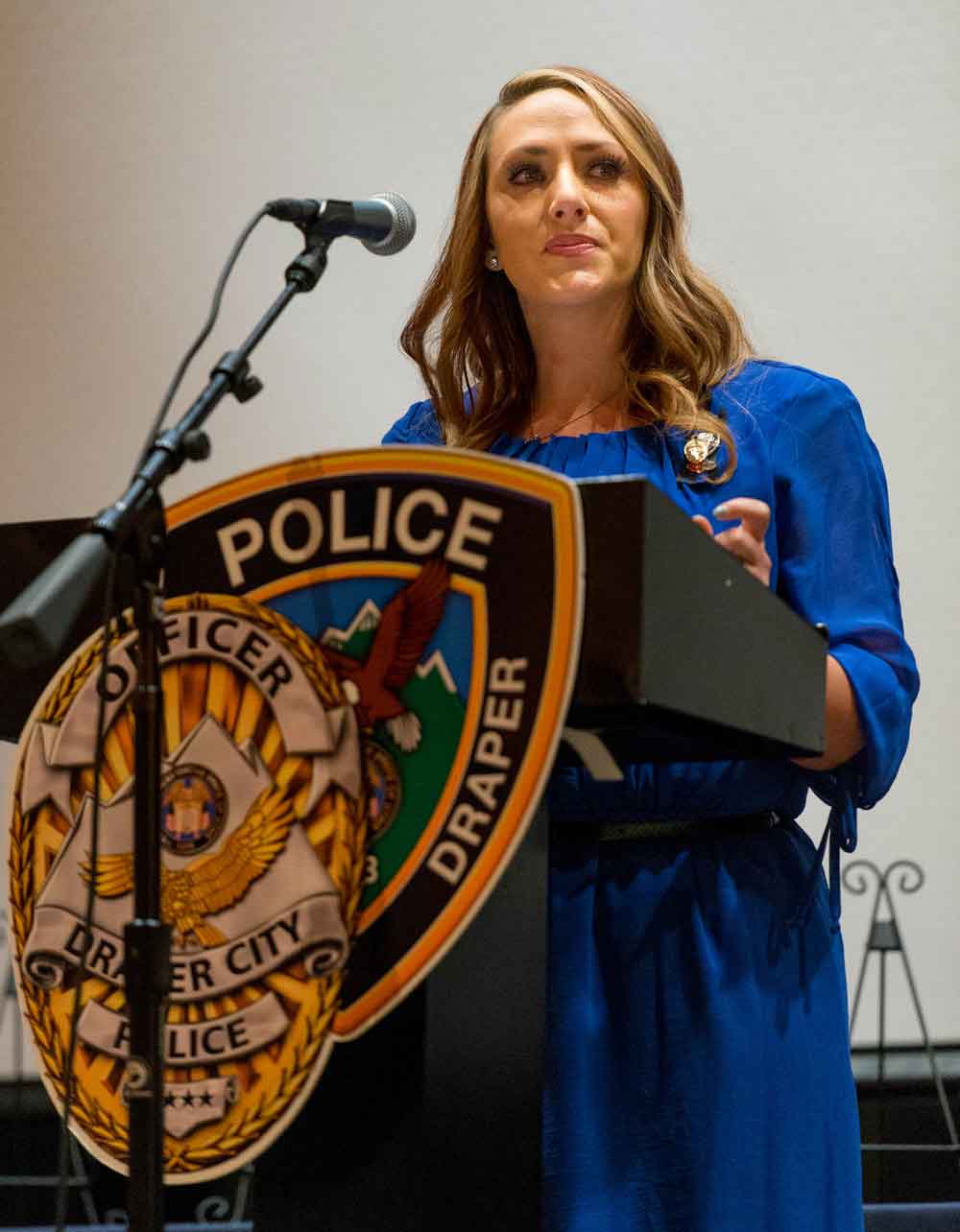
Shante Johnson, widow of fallen Draper Sgt. Derek Johnson, gives her thanks and love to the community at the Draper Police Department Awards Ceremony in Draper, Thursday, Feb. 27, 2014.
Photo by Trent Nelson | The Salt Lake Tribune
She loved the way Derek doted on their young son, Bensen; never took himself too seriously; and made her feel her family was safe. He kept the bad guys away and, at home, made sure the doors were locked and the motion-sensing lights on.
After his death, she endured a stream of quick memorials that led to the big funeral. She found solace among her family and close friends, in connecting with old acquaintances, and even in the kind comments of strangers. But that didn't stop the night from coming.
"I slept with the lights on for three months. I would stay up and watch TV until 3, 4, 5 in the morning, because I was just terrified that someone was going to break into the house," Shante said. "I didn't even leave my garage door open long enough to get my groceries into the house."
Slowly, her fear subsided. But the memorial services continued almost nonstop, culminating in National Police Week in Washington, in May 2014, about eight months after her husband's death. She watched as his name was added to the memorial wall. She attended the massive candlelight vigil, and then she went home. For the first time since Derek Johnson's murder, it became quiet around the house. She felt the full force of her grief and, with the help of a therapist, dealt with it.
When Jex came home from National Police Week, his life started to slowly unravel. But he didn't see a therapist. He thought that was for people who experienced something truly traumatic, people like Mike Valdes or Shante Johnson.
Ask police officers what's the worst thing they've seen on the job and most, if not all, will say a dead child. Brent Jex went 16 years without responding to such a call. His luck ran out Sept. 22, 2013, three weeks after Derek Johnson died.
A 6-month-old girl had caught a cold. Although her family had propped her up, she wiggled until she was lying flat on her tummy, her face pressed against a blanket. When the baby's grandfather checked on her in the middle of the night, she wasn't breathing.
Jex got the call and took a shortcut that got him there faster than the paramedics. He rushed inside while radioing dispatch to ask how to perform CPR on a baby.
"Be careful," he thought. "Don't push too hard, and don't blow too hard."
Three generations of family members were huddled over the unresponsive girl at the bottom of the stairs. Jex nudged them aside, got on his knees and gave two quick rescue breaths, putting his mouth over much of the infant's face. He would recall the salty taste of the baby's mucus when he got a cold a few days later. Next, he used two fingers to compress the baby's chest. He was at this for only a minute, probably less, before the pros arrived and took over. But there was nothing they could do. She was dead.
Jex was shaken for a few days, but he thought he had coped, compartmentalizing the tragic scene. But around National Police Week in May 2014, a full nine months later, he started struggling to sleep. Not long after he returned home from the ceremony, Jex woke up with his heart racing, his breathing harried and the taste of the baby's mucus in his mouth, so real it terrified him. It was his first panic attack.
He'd have more, most often when he was sleeping, but a few would strike in the middle of the day. The most alarming came when he was at his parents' house, helping to pour a concrete foundation for a garage. He became overwhelmed with anxiety and hurried to the bathroom, where he calmed himself down by turning on the sink and letting cool water run over his hands.
As the attacks continued, as militant exercise only made his insomnia worse, as he withdrew from his family, he stayed silent about his depression and anxiety. His thoughts drifted to Valdes, to Johnson, to that poor baby girl and, frequently, to Ron Wood.
Once he finally confided in his wife, Katie, during his emotional meltdown that October, she felt compelled to keep his secret, too, even as she feared he might harm himself.
"I couldn't call his parents, my parents, a friend. I just didn't know what to do," Katie said. "I was just given all of this information about how my husband was now struggling, and I had no clue how to help him."

“
I couldn't call his parents, my parents, a friend. I just didn't know what to do."
Jex's wife, Katie
Therapy seemed like a dangerous move — Jex assumed that if he sought help, his chief would find out, and he'd get bumped from narcotics to some desk job. Other officers would see him as unstable or untrustworthy.
In the middle of a major undercover case, Jex was disappearing for days at a time, while Katie was trying to hide her distress from their kids. A few times, neighbors saw her crying in her car before she went to work. They asked whether there was anything they could do. She didn't know what to say.
Finally, Jex agreed to let her talk to their Mormon bishop. The bishop later came by for a heart-to-heart with Jex, talking not about their faith but about determining when it was time to seek help from a professional.
A few days later, Jex made an appointment with Brian Murdock. They had met at a wedding, and Jex's brother-in-law was one of Murdock's golfing buddies. A friend of Katie's worked in his office.
For most of his career, Murdock has worked with troubled teens, but he's helped all types of people, including a few veterans. Jex liked him and had planned to sign him as one of the contract therapists for the new FOP program.
When Katie received his text saying he had made an appointment, she was overjoyed and literally jumped up and down. Jex was just nervous.
Mental health resources
Learn about the Utah Fraternal Order of Police Mental Health Program.
See DunamisPolice.org's page about trauma and mental health.
Find help for anyone experiencing suicidal thoughts at 1-800-273-TALK (8255). Utah also has crisis lines statewide.
The SafeUT app offers immediate crisis intervention services for youths and a confidential tip program.





